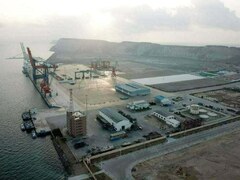 BRUSSELS: The eurozone economy expanded by a feeble 0.3 percent in the last three months of 2010, official figures showed Tuesday amid persistent fears that the debt crisis could sink more frail nations.
BRUSSELS: The eurozone economy expanded by a feeble 0.3 percent in the last three months of 2010, official figures showed Tuesday amid persistent fears that the debt crisis could sink more frail nations.
As European finance ministers met to discuss ways to shield the euro from future crises, Eurostat data confirmed the eurozone returned to growth in 2010, expanding 1.7 percent after a record 4.1 percent contraction in 2009.
But the single currency area sputtered in the last quarter of the year, coming in slower than the 0.4 percent predicted by economists as winter storms hit activity and austerity measures spread across Europe, analysts said.
This followed an equally weak 0.3 percent expansion in the third quarter after stronger growth of 1.0 percent growth in the second.
"It is likely that eurozone growth in the first quarter of 2011 will be lifted to a limited extent by the making up of some of the weather-related loss of activity suffered in the fourth quarter, particularly in the construction sector," said Howard Archer, chief economist at IHS Global Insight.
"Even so, we expect eurozone growth to be relatively muted overall during 2011 in the face of significant headwinds, most notably significant fiscal tightening increasingly kicking in and likely recurrent sovereign debt tensions," he said.
Eurozone finance ministers decided on Monday to set the effective lending capacity of a future bailout mechanism at 500 billion euros ($676 billion), doubling the firepower of a temporary fund that it will replace in 2013.
The EU bailed out Greece last year and set up the crisis fund that was tapped by Ireland at the end of last year. Analysts warn that Portugal and even the bigger Spanish economy could need rescues from market pressures.
The Eurostat figures put a spotlight on the two-speed recovery in the eurozone, which expanded to 17 members in January when Estonia adopted the euro.
While powerhouses Germany and France recorded growth of 0.4 percent and 0.3 percent in the fourth quarter, Spain expanded by 0.2 percent, Portugal shrank 0.3 percent and Greece was stuck in recession at negative 1.4 percent.
Compounding the eurozone's economic struggles, separate data showed that the bloc's foreign trade surplus fell to 700 million euros in 2010, down sharply from 16.6 billion euros in 2009.
"The latest GDP data confirm the worrying lopsided nature of the recovery across the singly currency area," said Chris Williamson, chief economist at Markit research firm.
"Ongoing weakness in the debt-laden peripheral countries contrasts with underlying strong expansion in Germany, with France sitting somewhere in the middle," he said.
Portuguese Finance Minister Fernando Teixeira dos Santos, whose country's borrowing costs are on the rise, lamented that Europe was moving too slowly to put in place new defences to protect the euro from more market upheaval.
"A country on its own cannot face up to the challenges posed by this crisis. We have to do our bit but we also need European efforts to stabilise the euro," he told reporters before a second day of meetings with EU counterparts in Brussels on Tuesday.
Eurozone leaders will hold a summit on March 11 before another meeting of heads of state and government from the entire, 27-nation EU on March 24-25 to agree on the permanent crisis fund and ways to coordinate economic policies.





















Comments
Comments are closed.